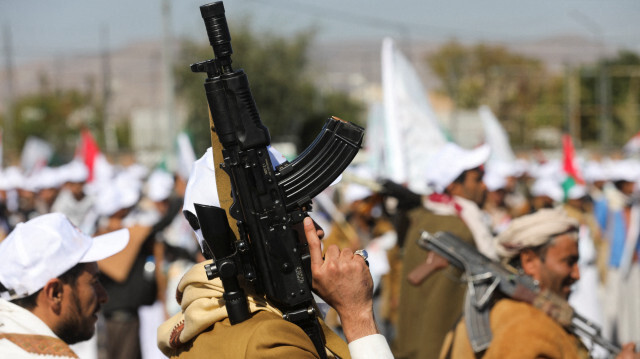Yemen's Maritime Threat: Escalation Promised Against Israel
The Houthi group threatens to expand its maritime campaign against ships en route to Israel, underscoring rising tensions in the Middle East.
Published May 04, 2024 - 00:05am

Image recovered from yenisafak.com
The Yemeni Houthi movement has made headlines with its announcement of a potential 'fourth round of escalation' against Israel, in response to the continued offensive in the Gaza Strip. Abdul-Malik al-Houthi, the group's leader, declared that further aggression by Israel and the US would lead to intensified targeting of vessels associated with Israel in solidarity with the Palestinian cause.
Amidst the largest gathering in Sanaa since early this year, the Houthi's military spokesperson Yahya Sarea outlined plans to target maritime navigation towards Israeli ports across the Red Sea and the Arabian Sea, and now potentially extending their reach to the Mediterranean Sea. This expansion, Sarea says, will include punitive actions aimed at enforcing a comprehensive blockade on ships heading to occupied Palestinian ports, with the group claiming the capability to attack them in areas previously not targeted.
Previous attacks have disrupted global commerce and led to casualties among ship crews, highlighting the Houthi's escalating military capabilities. These developments have resulted in substantial rerouting of container ships to avoid the contested areas, reflecting the broader impact of regional conflicts on international trade and security.
Responses from the US and UK, consisting of retaliatory airstrikes against the Houthi forces in Yemen, have been described by the group as insufficient deterrents. Instead, they emphasize their preparedness to undertake more powerful escalations should the Gaza situation persist. Such a threat of expansion in the Mediterranean could signal a new phase in the Houthi's strategic operations beyond current battlefields.
The situation remains fluid with potential ramifications for regional stability and international naval trade, as the Houthis show no sign of backing down despite international military efforts to curtail their activities. The challenge now lies in navigating this latest escalation without inflaming an already volatile region further.
The Yemeni Houthi movement's belligerent posture towards Israel, underscored by Abdul-Malik al-Houthi, signals a precarious turn in the already-tense geopolitical landscape of the Middle East. The group's ability to threaten maritime navigation poses a significant risk not only to Israel but to the international community, potentially escalating an already fragile situation into a larger conflict with global economic consequences.
Amid these tensions, maritime security has become an immediate concern for states reliant on the Suez Canal and Bab el-Mandeb Strait, vital chokepoints in global shipping lanes. Any disruption could lead to a surge in shipping costs and have a chain reaction on global supply chains, which are still recovering from the disruptions caused by the COVID-19 pandemic.
The Houthi movement, aligned with Iran, has leveraged its strategic position in Yemen to assert control over parts of the Red Sea. Analysts believe that Tehran's support, including sophisticated weaponry and military training, has turned the Houthis into a formidable force, allowing them to extend their influence beyond Yemen's borders and project power into maritime domains.
International efforts to resolve the ongoing conflict in Yemen have been sporadic and, to date, unsuccessful at achieving a sustainable peace. The United Nations has called for cessation of hostilities numerous times, but the complexities of the civil war, compounded by foreign interests and regional rivalries, have rendered peace initiatives ineffective. The deteriorating humanitarian situation in Yemen adds to the urgency of finding a political solution, yet the battleground seems to be shifting to the seas, presenting an even more daunting challenge to peacemakers.
The Houthi's explicit threats toward Israel have elicited concern from various quarters, including Egypt, which maintains the security of the Suez Canal. Any direct threat to this crucial waterway would have immediate implications for its economy and that of the wider region. Ensuring the safety of the Canal is paramount, not just for Egypt, but for the millions who depend on the uninterrupted flow of goods and energy.
The increased militarization of the Houthis and their assertiveness at sea have sparked discussions in the international community about bolstering naval patrols and enhancing maritime security measures. Some countries have already increased their naval presence in the region to ensure freedom of navigation, though such measures are not without risks of confrontation and unintended escalation.
For Israel, the threat from the Houthis adds another dimension to its already complex security landscape. The country has long focused on border threats from Lebanon and Gaza and the prospect of facing a new maritime threat to its southern ports requires a recalibration of its defense strategy. Israel's military is renowned for its technological prowess and agility, but addressing asymmetrical threats in the maritime environment presents a unique set of challenges.
The international community is closely monitoring the situation, recognizing the potential for these threats to materialize into aggressive acts. World powers, particularly those with vested interests in Middle Eastern stability and international trade, find themselves in a delicate position, needing to balance deterrence with diplomacy.
To avert a broader conflict, analysts suggest that a multi-faceted approach is necessary – one that combines military readiness with concerted diplomatic efforts aimed at de-escalating tensions and addressing the underlying issues that contribute to the instability in Yemen and the region. The quest for a diplomatic resolution, however, appears to be a race against time and the proliferation of military capabilities among non-state actors like the Houthis.
In light of the Houthi movement's threat, it is clear that the international community must tread with caution, balancing the need for security and stability with the imperative to address the root causes of the conflict in Yemen. Failure to manage this delicate situation could lead to repercussions far exceeding the bounds of the conflict, underscoring the global interconnectedness of peace and security in the 21st century.

:quality(70)/cloudfront-eu-central-1.images.arcpublishing.com/irishtimes/SV5HVQWI7BV6H65746THQB7QAM.jpg)





